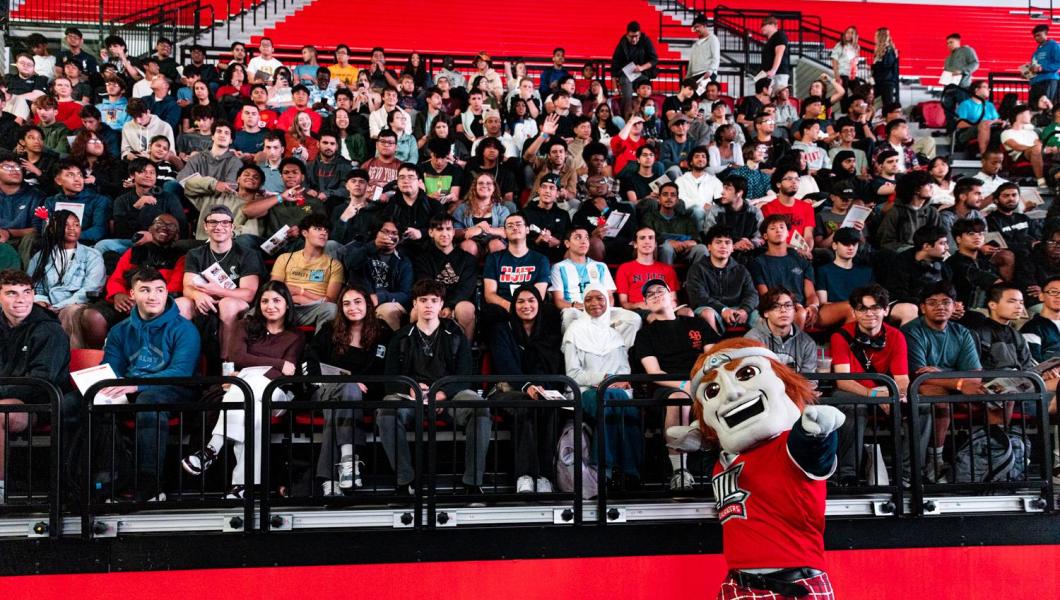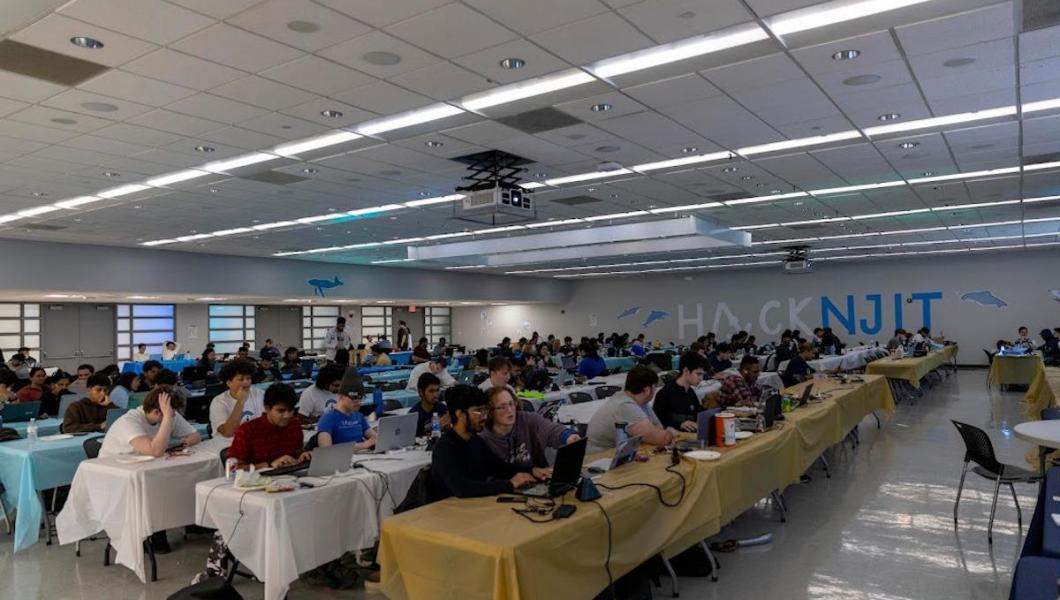NJIT Hacking Season '24 Wins with Themes of Steampunk and 1970s Culture

Coders, more than most people, spend hours upon hours clacking away at their keyboards, so they’re prime candidates for an invention that helps improve your posture — and so TheBackPak won this year’s edition of HackNJIT, earning $1,500 for its student developers.
TheBackPak uses gyroscopes and a microcontroller to gauge its wearer’s posture and report their status to a mobile phone application. It learns about each individual wearer, building a custom dataset. Its developers were NJIT students Matthew Tujague and Ricardo Vergara, Victor Jiminez from NJIT's Albert Dorman Honors College and Jason Shan from New York’s Hunter College.
“I was really struggling with posture and body image, and I've worked a long way to get to where I am right now. I was a lot bigger back then, and so I was kind of thinking of ways to help improve my image,” explained Tujague, a sophomore computer science major from Middletown. “And one of the things was that as a computer scientist who self-studied a lot in high school, I would sit up in my bed because my desk had no space, and I crawled over, hunched over, and so I thought of a device that would let me know when I had bad posture. Realistically, everybody's capable of maintaining good posture. It's just the reality of knowing that you don't have good posture at the current moment in time.”
Tujague said he’ll use his portion of the winnings to help pay for school next semester. Meanwhile, he and teammates are interested in continuing to develop TheBackPak into a real product, patenting it and possibly forming a company. “We're currently talking about a zipper system for moving the different gyroscopes and locking them in place. We've already implemented the data collection schema that would allow us to kind of universify our machine learning algorithm,” he said.
“TheBackPak stood out to me because they're not just using an already existing data set or an already existing language model, they are going out and creating their own,” HackNJIT organizer Will Simkins said. “They are getting that experience of what it is to create a model, and I think that is much more important than the utilization of an (existing) language model, or of prompt engineering.”
Simkins is president of the NJIT chapter of ACM, which formed the event in 2014. He is a fifth-year student from Dover, double majoring in computer science and applied mathematics. He joined ACM after his first year of college because he was tired of being holed up during the Covid pandemic.
“They had cool people to talk to … I like that about ACM,” Simkins explained. “It’s a group of computing majors who just like talking to each other, just like talking about what’s happening right now in computing, what's happening right now in life … ACM was made to get CS majors to be outside,” he joked. “So it’s a cool mission statement that I wanted to carry on.”
Simkins and ACM peers chose steampunk as this year’s hackathon theme. Simkins said one of his personal favorite entrants were a web game that functioned as a steam locomotive simulator and a food organization tool that encourages healthy eating.
In total there were 55 project submissions from 310 people, representing schools as far away as Texas. Most submissions are software, with about 5-10% being hardware. Event sponsors included Star Micronics, Merck, ISACA, Hyperswitch, AWS, GitHub and Antlion Audio.
GirlHacks Reaches Nearly 300 participants
Screenshot 2024-11-13 at 10.30.11 AM.png

NJIT’s annual GirlHacks event was equally successful this semester. The event is organized by the Women In Computing Society and had a record 290 attendees, compared to only 200 last year, said organizer Trang Dang, a senior computer science major from Vietnam.
The event is more than just female-led. “We make a beginner-friendly hackathon for students, especially for women and non-binary students. We had introductory workshops that teach us technical skills or technical concepts. We had basic API request workshops. We keep the safe space for women and non-binary students. ... We make it inclusive,” Dang explained. All genders are welcome to participate at GirlHacks as long as there are women on the team — this year more than 60% of the participants were women.
The grand prize winner for 2024 was a project called SpeakSavvy which uses artificial intelligence to provide feedback on the user’s public speaking skills. Dang said her personal favorite was a website called Glitz and Glam teaching users about 1970s culture through fashion, music and quizzes. Glitz and Glam won an award for Best Disco Vibes.
Trang said she learned a lot from running this event. “There were so many things that were unexpected and things happening at the same time. From this experience [as WICS president] I was more in touch with everything happening at GirlHacks than last year … I’m proud of my team, they did great work,” she noted. She plans to graduate in December and already has a software development job lined up at Meta.
GirlHacks sponsors included ADP, Avanade, Nokia Bell Labs, ISACA, Fiserv, Crowdstrike, Merck, AWS, GitHub and MongoDB.

